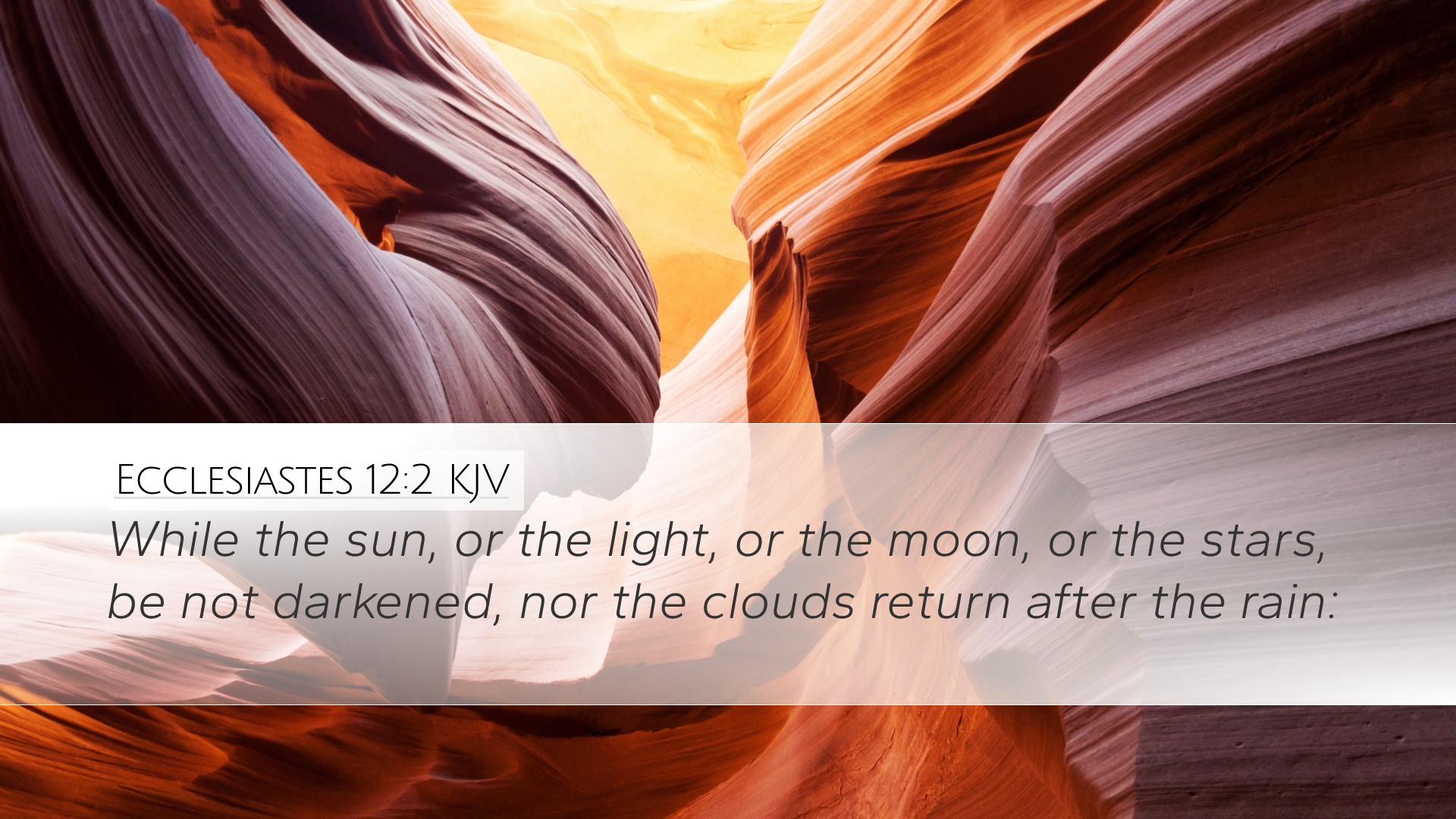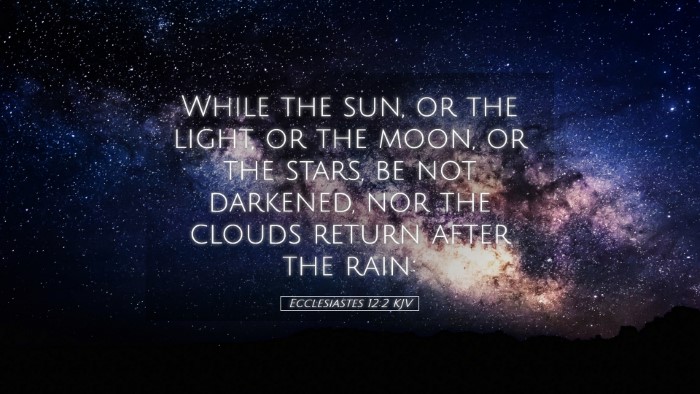Old Testament
Genesis Exodus Leviticus Numbers Deuteronomy Joshua Judges Ruth 1 Samuel 2 Samuel 1 Kings 2 Kings 1 Chronicles 2 Chronicles Ezra Nehemiah Esther Job Psalms Proverbs Ecclesiastes Song of Solomon Isaiah Jeremiah Lamentations Ezekiel Daniel Hosea Joel Amos Obadiah Jonah Micah Nahum Habakkuk Zephaniah Haggai Zechariah MalachiEcclesiastes 12:2
Ecclesiastes 12:2 KJV
While the sun, or the light, or the moon, or the stars, be not darkened, nor the clouds return after the rain:
Ecclesiastes 12:2 Bible Commentary
Commentary on Ecclesiastes 12:2
Ecclesiastes 12:2 (KJV): "While the sun, or the light, or the moon, or the stars, be not darkened, and the clouds return after the rain."
Introduction
The book of Ecclesiastes presents profound reflections on the nature of life, human existence, and the inevitability of aging and death. In Ecclesiastes 12:2, the Preacher uses vivid imagery to convey the fleeting nature of youth and the approach of old age. This commentary synthesizes insights from esteemed commentaries, providing a comprehensive view for pastors, students, theologians, and scholars.
Contextual Overview
The verse is situated towards the end of the book, which is traditionally attributed to Solomon. Ecclesiastes explores themes of vanity, the pursuit of meaning, and the certainties of life, particularly focusing on the transitory aspect of earthly experiences. The particular passage in chapter 12 serves as a broader reflection on mortality.
Verse Analysis
The verse begins with a reminder to consider the fleeting aspects of life. The references to the "sun," "light," "moon," and "stars" suggest the vital elements of life that give direction and clarity.
Imagery and Symbolism
The various celestial bodies represent life’s vibrancy and vitality:
- Sun: Symbolizing warmth, energy, and clarity.
- Light: Often associated with knowledge and enlightenment.
- Moon: Represents change and the passage of time, indicating cycles.
- Stars: Often signify permanence and beauty but are also distant and removed.
As these celestial elements can be obscured or eclipsed, so too can the joys and vibrancy of life fade with age.
Insights from Commentators
Matthew Henry's Commentary
Matthew Henry emphasizes the importance of recognizing the fleeting nature of youth and the vibrancy of existence. He suggests that the Preacher urges individuals to cherish the light and life they currently possess before they become dimmed by the realities of aging and life’s inevitable challenges.
Albert Barnes' Notes
Albert Barnes interprets the phrase “the clouds return after the rain” as indicative of life's cyclical nature. After moments of brightness, dark days inevitably follow, much like the weather. The imagery of returning clouds serves as a metaphor for troubles that may overshadow moments of joy, particularly in the later stages of life.
Adam Clarke's Commentary
Adam Clarke points out that the Preacher is warning against the vanity of earthly pursuits. He posits that focusing on temporal pleasures distracts from spiritual realities. Clarke emphasizes the urgency of seeking wisdom and understanding while one still has the capacity to discern and value them.
Theological Implications
The instruction to recognize that “the sun, or the light... be not darkened” holds significant theological weight. It reflects the overarching biblical theme of stewardship of time and the importance of living with purpose, awareness, and an appreciation of God’s gifts.
Practical Applications
In light of Ecclesiastes 12:2, scholars and pastors can draw several practical applications:
- The Value of Time: Time is a precious gift from God; believers are encouraged to use it wisely and not squander it on fleeting pleasures.
- Embrace Wisdom: Rather than chase after vanity, individuals should seek wisdom, which leads to a more fulfilling life.
- Prepare for Aging: Acknowledging the inevitability of age helps believers focus on the spiritual rather than the temporal.
- Hope in Christ: The passage reminds believers to maintain hope, as Christ is the ultimate answer to the anxieties surrounding life and death.
Conclusion
In summary, Ecclesiastes 12:2 offers a profound reflection on the inevitability of aging and the transient nature of life. Through the insights of prominent biblical commentators, we see an urging towards wisdom, an appreciation of the present, and a reminder of the comforting hope found in faith. As we reflect on this passage, may we be inspired to live with purpose, cherish the light, and prepare ourselves spiritually for the inevitable transitions of life.


